REDISCOVER OUR ROLE IN NATURE
- Get link
- X
- Other Apps
REDISCOVER OUR ROLE IN NATURE
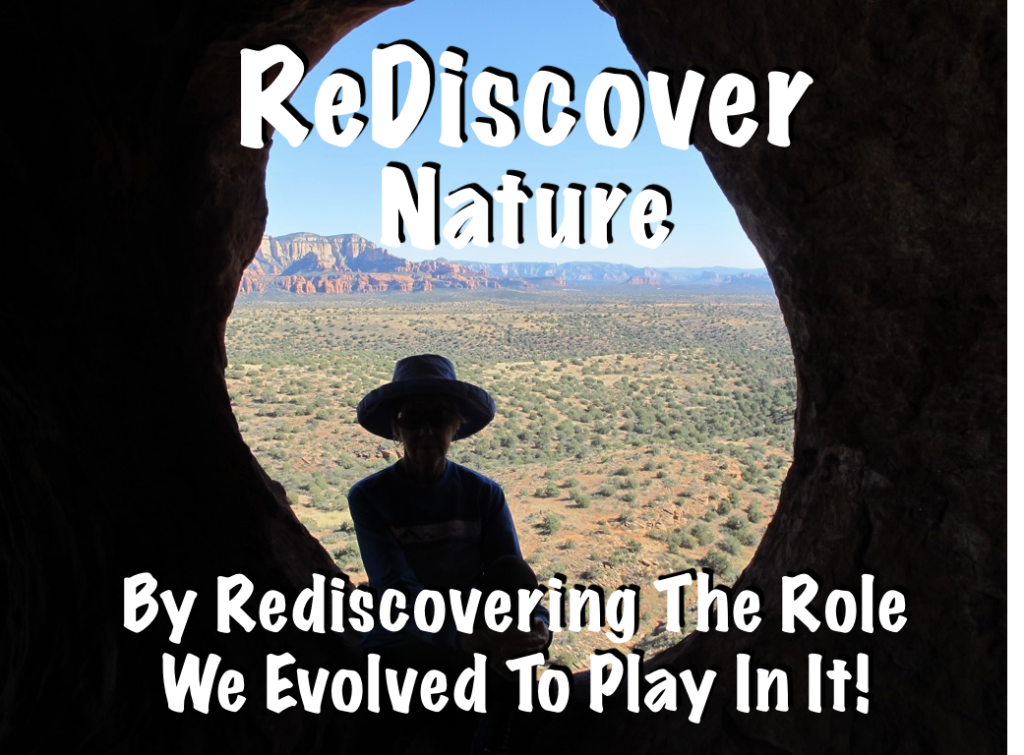
This “mis” understanding, which can be confirmed by evidence, has been created by what we have adopted as our standard definition of Nature — “All the animals and plants in the world and all the features, forces, and processes that exist or happen independently of people.” (Source the Cambridge Academic Content Dictionary).]
One of the problems caused by defining nature as “everything but us” is that doing so serves as a sort of blinder that impedes our ability to look into our past in a way that enables us to re-realize the relationship to Nature we evolved to fulfill and for a very long time did fulfill. By blinding us in that way, it keeps us from understanding, and appreciating the value, of the ways in which we have been an integral part of the Earthly eco-system for two million years or so. That’s how long various scientists say it has been since we evolved from our predecessor species, homo habilis.
During those millions of years of being part of the eco-system here on planet Earth, we lived and functioned as hunting & herding predators, scavengers, planters, harvesters, gatherers, and more. And we did it in the same way a lot of other animals we wouldn’t even think of deeming as “unnatural” have done it. We hunted like wolves, bears, and cougars, Harvested and gathered like gorillas and orangutans, scavenged like hyenas and jackals.
One could point out in response to this that, while we may actually have been part of Nature in those olden days, this changed once and for all when we developed agriculture and technology and became able to get what we need or want by manipulating Nature, not by being part of it. By means of agriculture we could plant, cultivate, and harvest the plants we want to eat instead of foraging and gathering them as deer, birds, and bees do. In the case of meat, we could breed, raise, pasture and process livestock, rather than hunting and herding the way wolves, lions and eagles do, and the way we, as Sioux, Blackfeet, Hottentots and cowboys once did and, in some cases, still do.
The problem with this is, it was about 12,000 years ago that we developed agriculture, which means that for roughly one million, nine hundred and eighty-eight thousand years (1,988,000 years = 99.994% of our existence on Earth ) we lived and functioned within the ecological system we call Nature in the same manner as creatures we call natural. As Homo Erectus, Neanderthalus, and early Sapiens we hunted like wolves and lions and gathered like chimpanzees and orangutans. In other words, for most of our earthly tenure the technologies and culture that serve to justify defining us as “separate” from nature and unnatural were irrelevant.
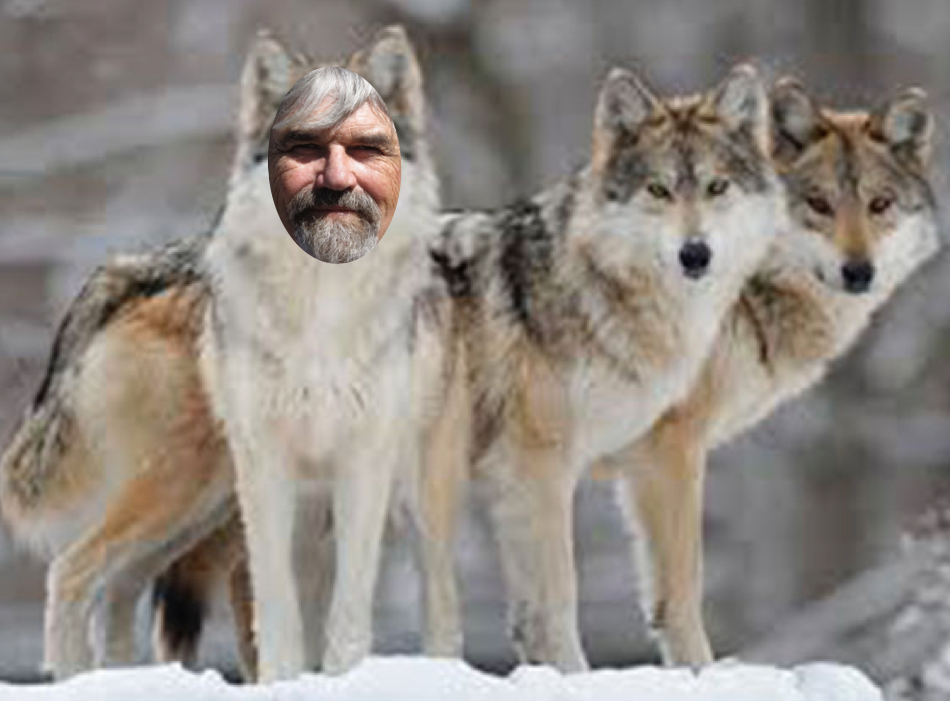
Another aspect of our natural-ness derives from the fact that we became part of this eco-community the same way everything else has and does — by evolution. Science now provides evidence that strongly suggests our predecessors evolved from an ape-like ancestor, Homo Habilis, by beginning to eat significant quantities of meat. Eating more meat (and less plants that were harder to digest) caused us to develop a more compact digestive system (gut) along with a more upright, longer-legged posture. That enabled (and caused) us to evolve into the more upright, more mobile Homo Erectus. It caused other changes in our abilities, too.
The desire, need, and urge to be a more effective hunter and acquire more meat provided the impetus for our intelligence to hit the fast track. According to anthropologist Professor Henry Bunn of Wisconsin University, “As a result, over the next two million years our crania grew, producing species of humans with increasingly large brains – until this carnivorous predilection produced Homo sapiens.”
When this change in our diet (eating meat) and the evolutionary transformation it caused were first discovered, it was assumed that our ancestors scavenged meat from animals who died naturally or were killed by predators such as lions, bears, etc. As science dug deeper into our past, and more of the story began to unfold, however, it became clear, as anthropologist Bunn put it, that, “Ancient humans used complex hunting techniques to ambush and kill antelopes, gazelles, wildebeest and other large animals at least two million years ago,” adding that “our apemen ancestors, although primitive and fairly puny, were capable of ambushing herds of large animals.” Like mammoths.
In other words, our meat-eating, evolved ancestors didn’t just become hunters, we became hunters of herds of large animals — bison, wildebeest, elk. This evolutionary transformation among humans launched by the eating of meat thus not only had a significant effect on our minds and bodies, it changed the role we played in the earthly eco-interaction. We changed from veggie gatherers to large animal herders. This, in turn, made us a more formative component of the earthly eco-system, and meant we played a significant role in the function of that ecosystem.
A notable example of this played a significant role in shaping the land Americans call home today. Native Americans were especially accomplished herd hunters, hunting herds of bison, elk, antelope, bighorns, etc. In fact there is a Native American rock art depiction of hunters herding what appears to be bighorn sheep over a cliff not far from my house near Sedona, Arizona.
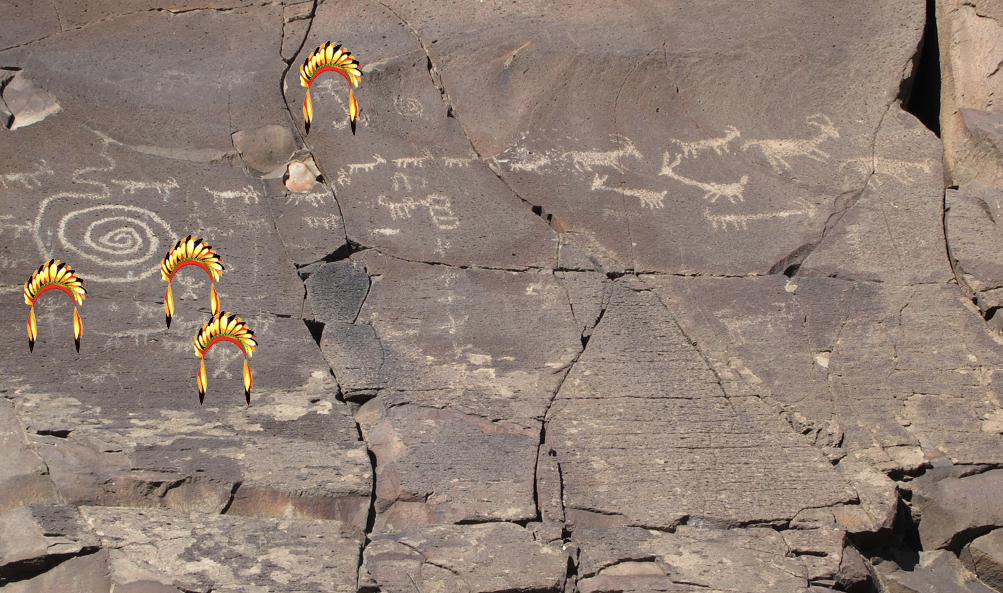
I added the headdresses to make the hunters/herders easier to see.
Valuable insight into the importance of hunter-herders to the health of earthly ecosystems is provided in “The Importance of Apex Predators for a Healthy Ecosystem” in the June 11, 2010 Greener Ideal, an independent environmental news and green living publication based in Ontario, Canada.
In that issue, author Colin Dunn writes: “Apex predators are key to the health of an ecosystem.”
The reason for that, he states is. “A healthy predator population will keep a herd (of herbivores) moving around, looking for cover, and generally trying not to get eaten,” By keeping those herds of herbivores moving, he adds, predators keep them from staying in one place and over-grazing and over-utilizing, which, in turn, prevents, “depleted lands, stunted forests (and grasslands), and flooding rivers,” This, he points out, “improves the health of the ecosystem as a whole,” Dunn then goes on to note that all those positive impacts are. “linked to the… movement of the large prey species,” which, again, is dependent on the presence of apex predators. In other words, the interaction between predators and their herd animal prey species, herding and moving, is a factor in creating and sustaining ecosystem health.
At this point, I feel I should mention that Mr. Dunn includes a qualifier in his article. He includes a version of the human exclusionary qualifier mentioned earlier. After writing that humans evolved to be one of the agents of this interaction between predators and herd animal prey species that are an important factor in creating and sustaining ecosystem health… and stating that, “the ultimate apex predators on Earth are humans,” Dunn adds that we are “more of a super-predator, operating in an unsustainable fashion.” In other words he acknowledges that we are apex predators, but paints us as the opposite of the “key to the health of an ecosystem.”
For me, there’s a significant irony in this. The irony is that the most striking examples I have encountered of exactly the very eco-benefits listed by Dunn as the results of apex predator/herd prey animal interaction were and are created by contemporary humans — cattle ranchers.
Deepening the irony, the ranchers who created the examples I encountered did it by employing exactly the actions Dunn attributes to functional/sustainable apex predators. In other words the ranchers kept their herds moving to keep them from staying in one place and over-grazing and over-utilizing. Thus, by fulfilling the apex predator role, which humans evolved to assume two million years ago, these ranchers were not only able to prevent, “depleted lands, stunted forests (and grasslands), and flooding rivers,” but they were able to prevent severe erosion, extinction of endangered species, depletion of riparian areas, depletion of wildlife, invasion of non-natives, and more. Add to this the fact that, by employing this apex predator/herd animal interaction as the key to ecosystem health that some of us have come to realize it is, these ranchers were able to heal erosion, restore riparian areas, vegetate mining wastelands, and even bring areas back to health and function that were made barren by “protection” (the removal of the apex predator/herd animal interaction when it included humans as the apex).
Take note that all of these listed benefits of restoring the evolved apex predator functions of humans are unveiled and explained in a variety of posts on this website, which I will provide a guide to in the next paragraph, but first, regarding the restorative effectiveness of “keeping herds moving to keep them from staying in one place and over-grazing and over-utilizing,” here are a couple of photos that illustrate the effectiveness of this method very vividly.
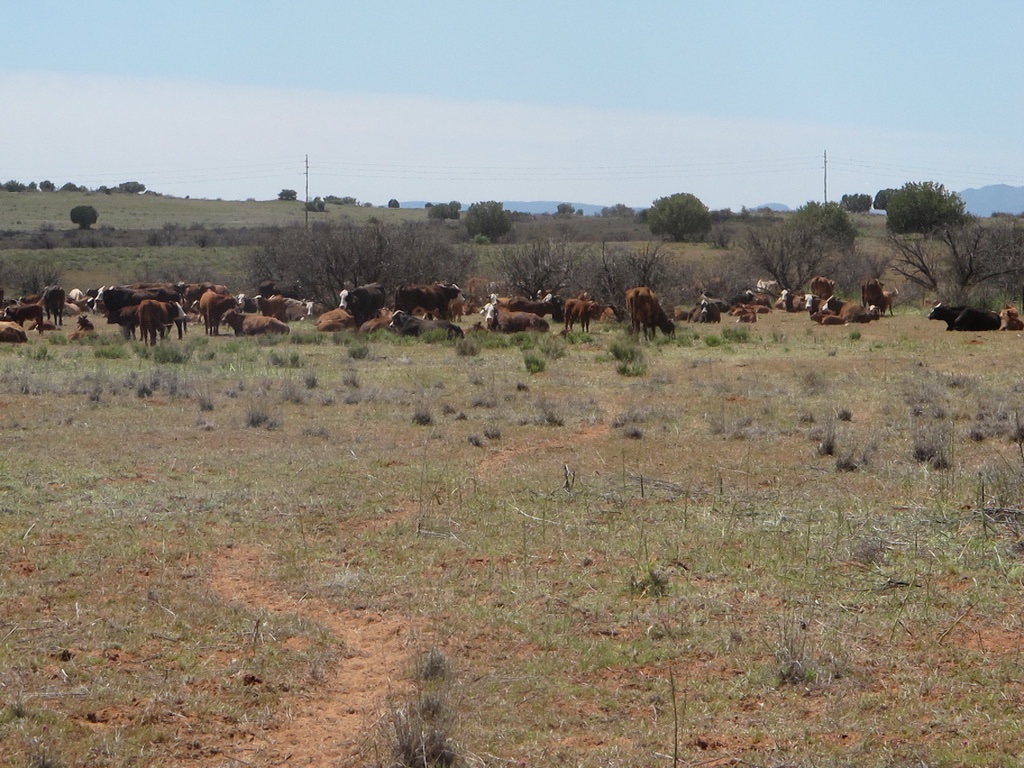
Cattle herded and kept moving to keep them from overgrazing and overutilizing by ranchers playing the apex predator role
Overgrazed? Did the method fail? How long will it take this to recover?
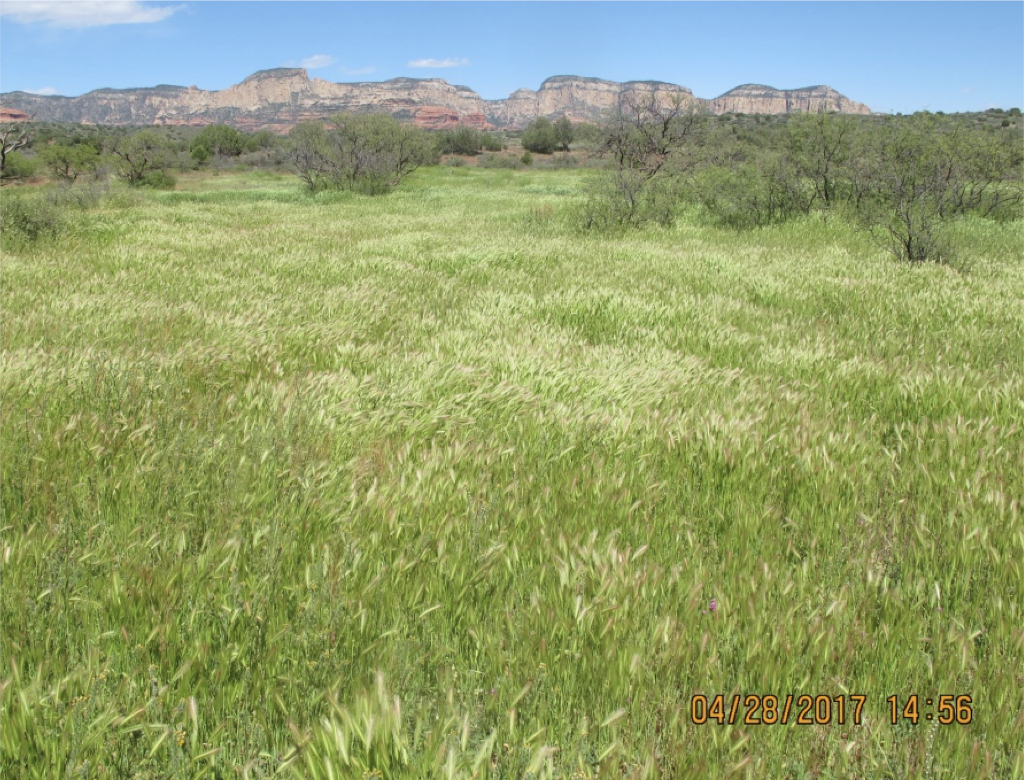
Same place a few months later. A vivid example of the effectiveness of humans playing the role we evolved to play.
Here’s a guide to a variety of posts on this website that unveil and explain the benefits of restoring the evolved apex predator functions of humans to the world we live in today (mostly the American West, but these functions are applicable in similar areas around the planet.) To view the post copy the title then scroll to the top and enter the title in “search”.
HEAL THIS WITH A KISS has some great information on healing erosion and restoring very damaged lands.
For more info on restoring very damaged land, check: AN EFFECTIVE, ECONOMICAL, NATURAL WAY TO RESTORE VERY DAMAGED LAND and IN HONOR OF ONE OF NATURE’S MOST EFFECTIVE RESTORERS – TERRY WHEELER.
Preventing extinction of endangered species, depletion of riparian areas, and depletion of wildlife: WHERE’S A REAL ENVIRONMENTALIST WHEN YOU NEED ONE! (MORE)
Reducing the susceptibility to wildfire (and healing the damage caused by wildfire): FIGHTING WILDFIRE WITH A REALLY GREEN, REALLY NEW, REALLY REAL DEAL and WHAT CAN WE DO TO REDUCE THE DAMAGE CAUSED BY WILDFIRES (AND THE FIRES, TOO)?
Preventing, “depleted lands, stunted forests and grasslands: (Pardon me if I re-recommend) DOES ENVIRONMENTALISM WORK? CONDUCT YOUR OWN ECOLOGICAL STUDY
In light of this, there is no way removing humans from an ecosystem in which they were playing this role, a role that dates back two million years and developed via evolution, would make that ecosystem “natural.” It would make it less natural — unnatural, in fact — as unnatural as removing wolves or lions or (on the other side of the predator/prey chain) bison or wildebeest. In cases I have experienced or researched, where that removal actually did happen, it didn’t make the ecosystem function better, it made it function less.
The flaw thus created in contemporary environmentalism is that, where this mis-definition of Nature is applied, it frequently (if not always) creates the exact opposite of what its applicators purport to intend and even the opposite of what they claim to have achieved (check those posts again).
That brings us to one last irony that reveals the true absurdity of the “mis”definition of Nature as “All the animals and plants in the world and all the features, forces, and processes that exist or happen independently of people.” When we use that mis-definition to create, apply and enforce policies to benefit an area by “returning it to Nature” any result, impact, or change that results is, by definition, unnatural. Why? Because it happens because of, not “independently of” people. Modern people at that. There’s those blinders again!
The best way to wrap this up is to repeat the insight Patrick McMillan voiced on one of his “Expeditions with Patrick McMillan” PBS programs: “We cannot understand the present without a clear understanding of the past.”
The good news is: some contemporary environmental groups are experiencing that awakening and making good use of it. THANKS AUDUBON — FOR REAL ENVIRONMENTALISM WHEN WE NEED IT!
Source: Right Way To Be Green
- Get link
- X
- Other Apps
Comments
Post a Comment